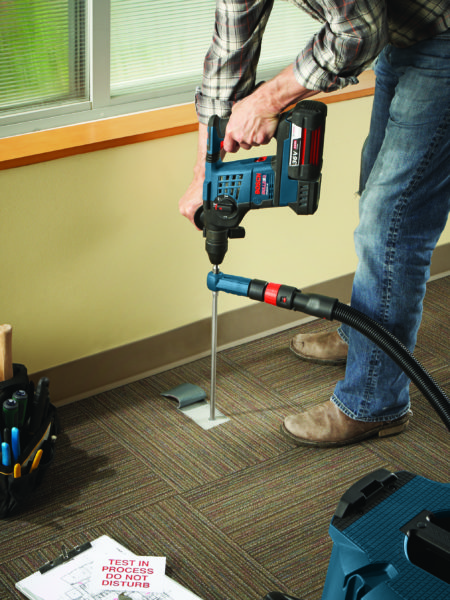
Reducing Respirable Silica Dust is a Requirement
On March 2, 2016, the U.S. Department of Labor issued a ruling on respirable silica dust. This ruling put the spotlight on how companies will need to reduce silica dust in drilling applications.
The Department’s Occupational Safety and Health Administration (OSHA) has been tasked with enforcing this regulation. As contractors, we need to reduce the amount of respirable silica dust that our workers are exposed to over an eight-hour period. The goal of this regulation is to reduce silica dust from 250 micrograms per cubic meter of air to 50 micrograms.
Reducing Silica Dust
250 to 50 micrograms is a big reduction, but there are tool technologies the exist to help us meet these requirements. For example, I like using the Bosch Hollow-Core Speed Clean™ Bits. When I attach these bits to a HEPA vacuum, airborne concrete dust is dramatically reduced. This system also obviously reduces respirable silica dust, benefiting everyone on the construction site.
Bosch Speed Clean Bits To Rescue
Bosch Speed Clean bits have an internal dust channel, milled to collect dust at the source and transfer it to the vacuum. This results in a cleaner, safer job site, which saves you time and money. The Speed Clean bits also produces way less dust than traditional drilling methods and Bosch also claims that these bits will reduce drilling time by up to 50 percent.
Bosch Speed Clean Bits are constructed with carbide tips, embedded in a four-cutter, steel head geometry. These Speed Clean bits come with a rubber connector that connects the shaft of the drill bit to the vacuum hose, creating a solid seal.
Reducing Silica Dust – A Collaboration
Bosch worked with engineering consulting firm Terracon to develop internal tests for reducing silica dust dust and silica exposure in concrete drilling.
The tests, performed by a certified industrial hygienist from Terracon, were designed to compare airborne dust concentrations in the personal breathing zone of a worker. They tested Bosch Speed Clean bits versus conventional solid-core concrete bits.
Four tests were conducted using each type of concrete drill bit. In all four tests Speed Clean rendered undetectable amounts of silica dust. The conventional concrete drill bits did not fair so well, as silica dust was detected in all four tests.
Stay safe!
